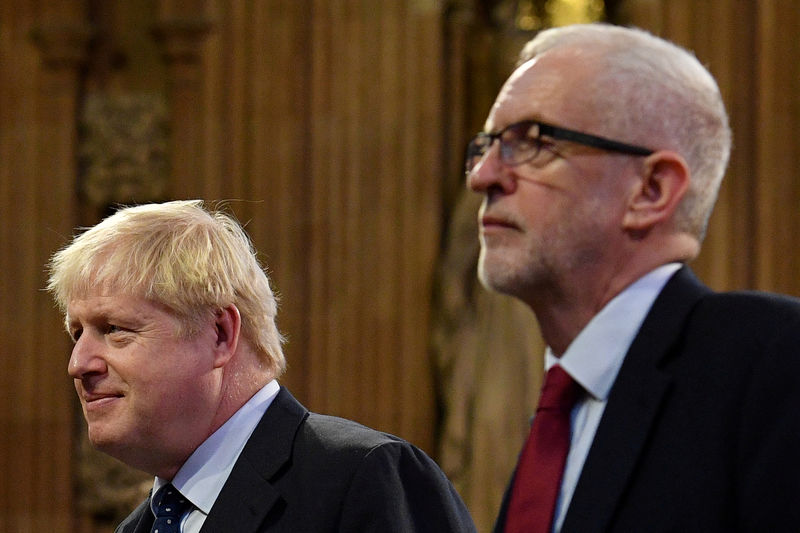By Andy Bruce
LONDON (Reuters) - Whether Brexit purists or radical socialists win Britain's election next month, a deluge of fresh debt is set to bloat the country's 1.6 trillion pound ($2.1 trillion) government bond pile.
But the permutations around the Dec. 12 election - and the implications for Brexit - make it tough for holders of British government debt to predict just what the borrowing bonanza will mean for them.
In 2010, Bill Gross - then cast as "king of the bond market" - warned that British government bonds were "resting on a bed of nitroglycerine" because of Britain's large budget deficit.
Since then, however, demand for gilts - named after the gold-edged paper on which they were first printed - has risen as investors with huge liabilities, such as pension funds, sought the safety of reliable borrowers. Britain, the world's fifth-biggest economy, has never defaulted.
"You have a big imbalance globally between the demand for safe assets and the supply of safe assets," said Andrew Balls, chief investment officer for global fixed income at Pacific Investment Management Company (PIMCO).
PIMCO, which Gross co-founded, is the world's biggest bond manager, with $1.9 trillion under management.
"In this kind of environment, you're less likely to have a big bond market reaction to promises in terms of fiscal policy," Balls told Reuters.
There is no consensus among investors on how much extra British debt would be too much. What is clear is that Britain's bond market is about to get bigger.
Prime Minister Boris Johnson, whose Conservative Party leads opinion polls, has promised to increase public spending to levels not seen in Britain since the 1970s, a break from the party's decade-long focus on fixing the public finances.
The opposition Labour Party, under its socialist leader Jeremy Corbyn, has promised an even bigger increase in spending as part of an "irreversible shift in the balance of power and wealth in favor of working people".
Labour's plans to nationalize some utilities are already having an impact on corporate debt prices.
British government borrowing costs remain close to record lows, with the 10-year bond yielding 0.75%, in part reflecting a bond market view that a Labour majority government is unlikely.
ON A GILT TRIP
Britain has more leeway to rack up debt than some of its peers.
Its overall debt as a share of economic output stood at 87% in 2018, more than double its level before the 2008-09 financial crisis but below France's 98% and the United States' 104%, according to the International Monetary Fund.
With interest rates near zero across the world and central bank toolboxes empty, Britain's fiscal splurge could place it at the vanguard of another Western experiment in bond-fueled stimulus.
Philip Shaw, chief economist at Investec, said Britain sold more than 200 billion pounds of gilts in the 2009/10 financial year alone as the crisis wrought havoc with the public finances.
"There didn't seem to be a huge problem in coping with that," Shaw said.
The Conservatives have committed to increase investment spending by 20 billion pounds annually, while Labour has pledged an extra 55 billion pounds a year.
Longer-term trends in the budget deficit - the gap between the government's income and spending - would probably have more impact on the value of gilts, Shaw said, although: "It's not clear at what sort of deficit that would happen."
Britain's budget deficit peaked during the crisis at just over 10% of GDP.
Domestic investors like pension funds and insurance firms, plus the Bank of England, account for the majority of gilt holdings, offsetting the risk of a sell-off by foreign owners if issuance rises.
"Investors will accept this supply," Sunil Krishnan, head of multi-asset funds at Aviva (LON:AV) Investors, said. "But the question is the price they will demand - especially on the international markets."
Foreign owners accounted for only 25% of British government debt securities in 2017, compared with 30% in Italy and 47% in France, according to Eurostat data.
The relatively low share reflects sterling's minor role in global markets, with foreign institutional investors like sovereign wealth funds and central banks mandated to hold only a small share of sterling assets like gilts.
Britain is no longer triple-A grade but retains high credit ratings. Unlike peers such as France, however, a worsening outlook for the public finances means downgrades are seen as a risk, even before taking into account election spending pledges.
'WE ARE WAITING'
For now, at least, foreign investors are waiting to see who wins the election and what it means for Brexit, which has slashed the value of sterling since the 2016 referendum.
Johnson's traditionally pro-market Conservative Party is committed to taking Britain out of the European Union, something many investors see as a negative for growth prospects, at least in the short to medium term.
Labour's Corbyn has promised to renegotiate the Brexit divorce deal and put it to a second referendum, leaving open the prospect that Britain might not leave the EU at all.
"Previously, for a decent few years, we were in general underweight in sterling (assets) due to the volatility," said Shin Sawada, an investment management director at Sumitomo Mitsui Trust International, Asia's biggest asset manager with around $600 billion under management.
"Going forward, we don't know. We are waiting for the outcome of the Brexit discussions."
